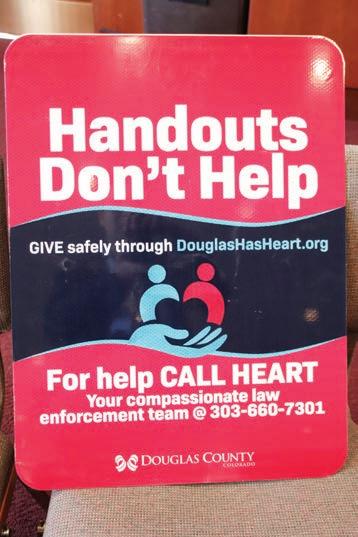
14 minute read
County joins lawsuit against state over Prop. HH
BY THELMA GRIMES TGRIMES@COLORADOCOMMUNITYMEDIA.COM
On the same day Gov. Jared Polis signed Senate Bill 303, Douglas County Commissioners announced they will be joining a lawsuit to challenge the measure that looks to put Proposition HH on the November ballot, asking voters to approve a plan Democrats say will slow the increase in property taxes.
As property owners statewide are facing up to 50% tax increases, Democrats introduced Senate Bill 303 three days before the 2023 legislative session ended. With no public discussion and little debate, the bill passed the Democrat-controlled House and Senate and was signed by Polis.
Passing SB23-303 allows the state to place what is known as Proposition HH on the November ballot.
e measure asks voters to approve taking a portion of the TABOR surplus, or the state tax refunds citizens receive, and divert it for at least 10 years to homeowners and commercial property owners to keep property taxes lower.
Before Polis could even put ink to paper to sign the bill, legal challenges were led. e lawsuit challenging the proposition was led by Advance Colorado and by Steven Ward, who also serves as a member of the Englewood City Council. e county announced on May 24 that it would be joining the original lawsuit. e primary focus of the legal challenge is the subject of the ballot measure, which plainti s claim violates the state’s single subject and “clear title” statutes.
According to the Douglas County announcement, commissioners believe the bill should be declared void and unconstitutional, precluding its implementation and enforcement; or, as an alternative, that the ballot title should be corrected “to provide a clear, detailed, and politically neutral explanation of its contents.” e commissioners believe the title of the bill is misleading and does not clearly express the subject of the ballot measure.
“Any way you slice it, SB23-303 and Proposition HH do not prevent residential property owners in Douglas County from experiencing what will be the largest property tax increase in state history,” said Board of Commissioners Chair Abe Laydon.
At question is what exactly residents are voting on in November. While Democrats say the 10-year pause on TABOR will provide property tax relief, opponents say it will decrease the mandated state tax refund residents receive from revenue surpluses.
Commissioner George Teal said selling this ballot item as “property tax relief” while sending TABOR refunds to fund state government and making long-term changes to the TABOR formula while failing to specify that the state surplus is being used to “unnecessarily” back ll local taxing authorities is “misleading.” omas said it simply takes away TABOR refunds, which are the “last remaining bit of tax relief” citizens have.
Commissioner Lora omas said pushing Proposition HH in the “11th hour” of the legislative session without the contribution or approval from the local governments it directly a ects does not x the property tax issues.
“Speci cally, the bill and ballot titles both fail to include any numbers concerning the property tax assessment rates and do not clearly inform voters that the property tax assessment reduction is minimal,” commissioners said in the provided statement.
Douglas County commissioners agree that Colorado law and precedent require that voters be informed of signi cant changes to law and of relevant numbers when they are asked to vote on a ballot measure.
To keep citizens informed, the county is planning to hold a series of town hall meetings. With the dates to be determined, residents can learn more about upcoming events by visiting the website at douglas. co.us and search live town halls; or call the board at 303-660-7401.
Turn To The Colorado Sun For News Across The State
The Colorado Sun is a journalist-owned, award-winning news outlet that strives to cover all of Colorado so that our state — our community — can better understand itself.
In this way, The Sun contributes to a more vibrant, informed and whole Colorado.
The Sun, launched in 2018, is committed to fact-based, in-depth and nonpartisan journalism. It covers everything from politics and culture to the outdoor industry and education.
Now, The Colorado Sun co-owns this and other Colorado Community Media newspapers as a partner in the Colorado News Conservancy. The Sun is CCM’s partner for statewide news.
For Colorado Sun stories, opinions and more, and to support The Sun’s misssion as a member or subscriber, visit coloradosun.com.

“We have crafted the ordinance to avoid those areas that have been found and treated negatively by the (Boulder lawsuit),” Garcia said. “We are already doing exactly what the court has asked us to do and we are following the court’s direction to provide for our community’s safety.”
Commissioner Abe Laydon, who spoke in favor of the bill, said, the ordinance will continue to build on the hard work of the Douglas County Homeless initiative.


“When you look at cities like Seattle, Portland, and San Francisco where rampant camping is allowed to persist at the expense of taxpayers and the business community – there is sort of a blind eye that’s turned to those sorts of encampments,” he said. “I’m really proud of the elected o cials in Douglas County, my colleagues and mayors and council members in municipalities that have uniformly supported this campaign.”
More discussion will be held on June 20.
About Letters To The Editor
Colorado Community Media welcomes letters to the editor. Please note the following rules:
• Email your letter to letters@coloradocommunitymedia.com. Do not send via postal mail. Put the words “letter to the editor” in the email subject line.
• Submit your letter by 5 p.m. on Wednesday in order to have it considered for publication in the following week’s newspaper.
• Letters must be no longer than 400 words.
• Letters should be exclusively submitted to Colorado Community Media and should not submitted to other outlets or previously posted on websites or social media. Submitted letters become the property of CCM and should not be republished elsewhere.
• Letters advocating for a political candidate should focus on that candidate’s qualifications for o ce. We cannot publish letters that contain unverified negative information about a candidate’s opponent. Letters advocating for or against a political candidate or ballot issue will not be published within 12 days of an election.
Are you prepared for wildfires?
It only takes one spark to change your life forever. Thankfully, it takes only seconds to sign up for free emergency notifications, ensuring that you will be in the know if a wildfire is happening near you. Sign up today at douglas.co.us/CodeRed
Is yard work on your to-do list?
Warmer weather is ahead, and you can drop off any tree limbs, shrubs or brush that you need to dispose of for free every Saturday through October at Douglas County’s Slash-Mulch site. For more information, visit douglas.co.us and search for Slash Mulch.
Skip the trip!
Motor vehicle services


just a click away
Renew your driver license or motor vehicle registration and more from the convenience of your smartphone, tablet, desktop or laptop. You can also renew vehicle registrations at six local grocery store MVExpress kiosk locations. Find information at DouglasDrives.com
• Publication of any given letter is at our discretion. Letters are published as space is available.
• We will edit letters for clarity, grammar, punctuation and length and write headlines (titles) for letters at our discretion.
• Please don’t send us more than one letter per month. First priority for publication will be given to writers who have not submitted letters to us recently.
• Submit your letter in a Word document or in the body of an email. No PDFs or Google Docs, please.
• Include your full name, address and phone number. We will publish only your name and city or town of residence, but all of the information requested is needed for us to verify you are who you say you are.
• Letters will be considered only from people living in Colorado Community Media’s circulation area in Adams, Arapahoe, Clear Creek, Denver, Douglas, Elbert, Je erson and Weld counties.
• Do not use all caps, italics or bold text.
• Keep it polite: No name calling or “mudslinging.”
CSU Extension is helping Douglas County residents learn to grow vegetable gardens while planting extra to share with local food banks and community members in need. Longtime gardeners or first-time planters can get info at GrowandGiveColorado.org
Live Town Hall meetings
Did you know Douglas County offers Live Town Hall meetings, inviting you to engage in the local issues of importance to you and your neighbors? Register at douglas.co.us/townhall to ensure you are contacted about all future Live Town Halls. Join online or by phone and listen to community conversations, ask questions and hear responses from experts.
2023 Bike to Work Day
Wednesday, June 28
Put some joy back into your commute! Join Way to Go and thousands of Denver-region residents for Bike to Work Day. Register to swap a ride in your car for a ride on two wheels on Wednesday, June 28, and help improve air quality. Sign up and be automatically entered into a drawing to win prizes. Visit biketoworkday.co for more information
‘It’s time for me to speak up’









Sitting in her home in Centennial, surrounded by photos of her daughter, Lujan described Lauren’s many talents, from her beautiful singing voice to her athletic skills.

“People always say, you know, someone lit up a room. She really did,” Lujan said. “I feel blessed that she was in my life, even for a short time. She taught me a lot.”
Lauren lived with the mentality that she could accomplish whatever she put her mind to, her mom said.
“One of the greatest things about Lauren is she just — she had such a big heart,” Lujan said. “She was amazing because she found the beauty in everything.”
On March 29, 2020, Lauren was on spring break and staying at her father’s house, according to the lawsuit. She left the house for a few hours, which is when her parents thought she met up with someone, whom she communicated with via Snapchat, to get the painkiller Percocet.
The next morning, on March 30, Lujan was working in her office, which is near Lauren’s father’s house. She remembered getting a phone call from Lauren’s father, who said he did not think Lauren was breathing and that she was dead.

Lujan went to the house, where she saw paramedics and an ambulance.
“They wouldn’t let me in. So, I’m trying to, like, storm into the house to get to her and they wouldn’t let me in, which was horrible. And then I followed the ambulance to the hospital,” she said.
“Supposedly, she was alive when she went to the hospital,” Lujan recalled. “They kept coming in and telling me, ‘OK, well, we got a heartbeat.’ And it was like, ‘It’s really faint.’ And yeah — nightmare.”
According to the lawsuit, the Percocet that Lauren took was a pill laced with fentanyl. Lauren died from fentanyl poisoning on March 30.
The National Institute on Drug Abuse explains on its website that when people overdose on fentanyl, their breathing can slow or stop, which decreases the amount of oxygen reaching the brain and can lead to death.
Song for Charlie is a national nonprofit that raises awareness about fake pills made of fentanyl. It argues that when someone dies after taking a fake pill made of fentanyl, these deaths should be classified as “poisoning” rather than “overdose” because the person did not know what they were ingesting.
It took Lujan a long time to find out what had happened, she said.
“I don’t know if it was six months later, or nine months, or a year later, really, when I finally read the autopsy report and realized it was fentanyl, and that she took one Percocet and it was laced,” Lujan said.
“I didn’t really think much more about it because the grief and the sorrow is overwhelming. And for me, not thinking about it, not dealing with it, was my defense mechanism,” she said. “I was just trying to deal with, you know, coping with the loss of my daughter.”
A year ago, Lujan began wondering what happened with the police investigation. She contacted the Arapahoe County Sheriff’s Office and spoke with someone who essentially said, “‘Once we realized it was (Snapchat), there was nothing more we could do,’” she recalled.
At that moment, she felt emotionally overwhelmed and was unable to think straight, she said.
“And so, I just let it go,” she said.
But then a friend told her it was time “to get angry about this,” Lujan recalled
One day, Lujan’s friend mentioned she heard on the news about the Social Media Victims Law Center and a lawsuit against Snapchat. Lujan did some research and reached out to the center
“I feel like it’s just time for me to not sit back anymore,” Lujan said. “It’s time for me to speak up.”










“I kind of look at it like she was murdered. And I’m upset because Snapchat doesn’t seem to do anything,” she said. “I almost feel like these drug dealers are protected behind Snapchat.”
The fight against Snapchat
The wrongful death lawsuit alleges that Snapchat created an environment that allows drug dealers to “operate in a manner that directly contributed to the deaths of nine minors and young adults,” according to a Social Media Victims Law Center news release.
The nine minors and young adults are Lauren Lujan, Moses “Malik” Majekodunmi, Juan Jiménez Trujillo, Cole Brown, Michael Leonardi, Dylan Moore, Kevin Andrew Hutchings, Jaylen Penix and Allie Higdon.
Each of these individuals died after taking fentanyl-laced pills and/or edibles purchased from drug dealers connected to them by Snapchat, according to the news release.
“I want to be really clear — we don’t condone the sale of prescription drugs outside of a doctor’s prescription. We also understand that young people make bad decisions. They don’t deserve to die for it,” said Matthew Bergman, founding attorney of the Social Media Victims Law Center.
A wrongful death lawsuit alleges that a person lost their life as the result of the misconduct of another, Bergman said.
“In this case, the negligent and unreasonably dangerous design of the Snapchat platform,” he said.
























He noted that it does not mean there are no other factors at play, and while he acknowledges people should not use prescription drugs without a prescription, “that doesn’t mean that they needed to die for it.”
“And that doesn’t mean that it’s appropriate to absolve Snapchat of its responsibility for contributing to the situation that led to the child’s death,” he said.
The lawsuit alleges that Snapchat’s platform “purposefully obstructs parental supervision” and “enables (drug) dealers to locate and access nearby minors and young adults,” per the news release.
Bergman said Snapchat provides people the opportunity to commit a crime knowing that the evidence is destroyed after the crime is committed, since Snapchat automatically deletes messages.
“The disappearing message feature allows drug dealers to actually put a menu or a smorgasbord of drugs online, knowing that the evidence of their crime will … disappear,” Bergman said. “The only benefit of the disappearing messages is to perpetrate crimes.”
Bergman noted Snapchat also has a geolocating feature, also called a “Snap map,” that allows users to share their location with one another. This feature allows for drugs to be delivered “like DoorDash or Uber Eats,” he said.
A third feature that Bergman said “unnecessarily facilitates young people hiding, forever, evidence of their solicitation of drug dealers” is Snapchat’s “my eyes only” feature, which allows for users to hide content behind a passcode on the app.
“They have made (an) intentional decision to not change the architecture of their platform, presumably because one of the appeals of the platform is to encourage kids to evade parental responsibility,” he said about Snapchat. “They’ve decided to not implement readily available design modifications because it reduces engagement, and their profits are tied to engagement.”
The lawsuit’s prayer for relief, meaning the damages and other remedies it is seeking, includes requests for punitive damages, loss of future income and earning capacity of each of the nine people, and monetary and emotional damages suffered by plaintiffs.
“This is not a case that is about the money. These families have suffered the worst loss that anybody can imagine,” Bergman said. “If through these efforts, we can prevent one family from going through this loss … then it’s worth it.”
The relationship between fentanyl and social media
At least every other day, the Social Media Victims Law Center hears from another parent who lost a child to fentanyl, Bergman said.
“I can’t tell you how horrible it is to get all of these calls,” he said.















“We have 70 cases filed involving children who have died of fentanyl.”
Bergman urges parents to have open discussions with their children about the risk of fentanyllaced drugs.
“It’s a hard discussion to have because no kid is ever gonna want to admit to their parent that they might be tempted to use Oxy or Percocet or something like that,” he said. “But I think you need to have the kind of discussion and relationship with your kids so that they understand that they can die from this … and that the prospect of getting drugs online from a stranger is not worth the risk.”
“As opposed to just saying, ‘Don’t ever do this,’ saying, ‘If you — I hope you never do it, but if you do, don’t do it this way,’” he added.

According to the United States Drug Enforcement Administration (DEA), fentanyl is involved in more deaths of U.S. citizens under the age of 50 than any other cause of death.
The Colorado Department of Public Health and Environment found that the state’s total number of drug overdose deaths due to synthetic opioids mentioning fentanyl increased from 540 deaths in 2020 to 912 deaths in 2021, repre- senting an increase of nearly 69%.
As reported by Bloomberg in January, the Federal Bureau of Investigation is examining Snapchat’s role in fentanyl poisoning deaths.
Bergman said the Social Media Victims Law Center only has one case where Snapchat was not the conduit through which the fentanyl-contaminated drugs were obtained.
“The fentanyl phenomenon appears to be a Snapchat-only problem, arising from the unique design of the Snapchat platform,” he said.
Colorado Attorney General Phil Weiser released a report in March highlighting how social media platforms are used for illicit drug activity.
In the report, it notes that online access to illicit drugs is a “wholeof-Internet” challenge, as drug sellers are often active on multiple social media platforms.
The report describes the challenges that social media platforms like Snapchat may present to law enforcement investigations, given the “disappearing content.”
“When platforms intentionally tout features like near-immediate deletion of communication exchanges and short retention periods of data held on the platforms’ servers, it puts law enforcement at an extreme disadvantage when investigating those using the platforms for illegal activities like selling drugs,” said Cmdr. Nick Goldberger of the Boulder County Sheriff’s Office in a news release.
The report also mentions the Social Media Victims Law Center’s civil lawsuits against Snap Inc.

“This is, by any fair estimation, cutting-edge litigation. And it is unclear how this is all going to come out because we’re the first firm to do it,” Bergman said. “We have no illusions that this is an easy fight. And we have every expectation that Snapchat is going to fight every step of the way.”
Snapchat’s response
In an emailed statement to Colorado Community Media, a Snap Inc. spokesperson wrote, “While we can’t comment specifically on active litigation, we can share all the progress we have made in this area.
“We use cutting-edge technology to help us proactively find and shut down drug dealers’ accounts. We block search results for drug-related terms, redirecting Snapchatters to resources from experts about the dangers of fentanyl.
“We continually expand our support for law enforcement investigations helping them bring dealers to justice, and we work closely with experts to share patterns of dealers’ activities across platforms to more quickly identify and stop illegal behavior.
“We will continue to do every-







